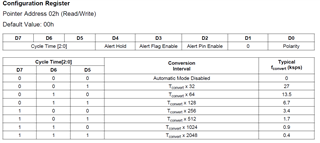An 8-channel MUX is connected to the input of the ADC121.
The ADC is using auto mode and the MUX channels are switched every 1ms before reading out with SDA.
I would like to ask about the disadvantages of increasing the sampling rate of fconvert.
I actually did a comparison between 1.7ksps and 13.5ksps settings.
The 13.5ksps was more accurate as a reading.
I would like to know if there is a recommended setting method.





